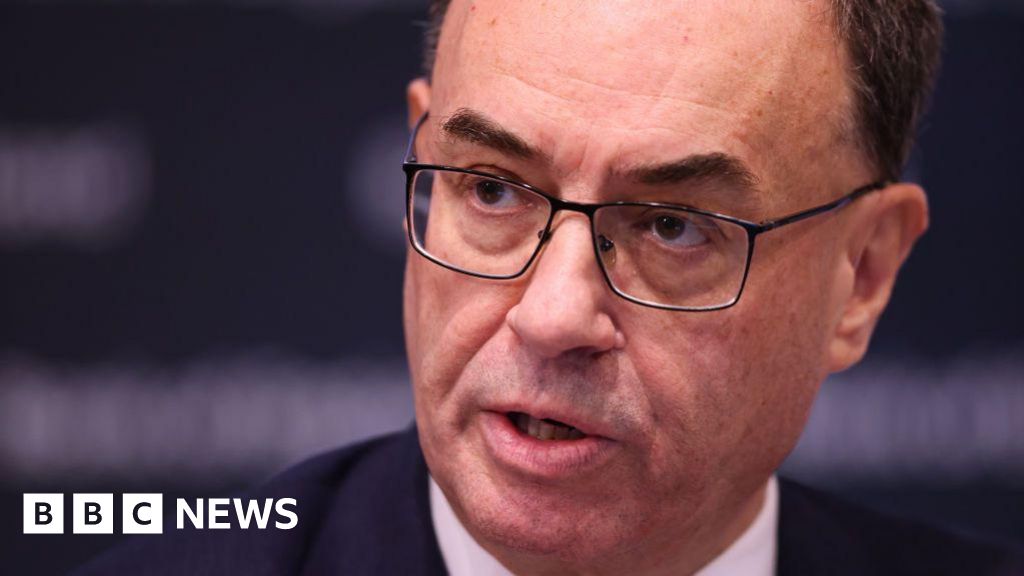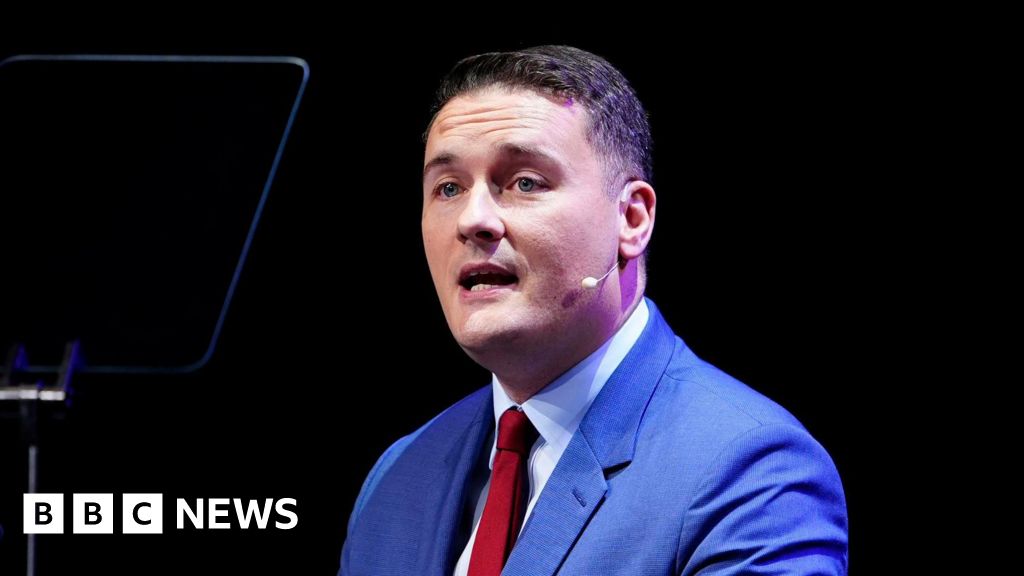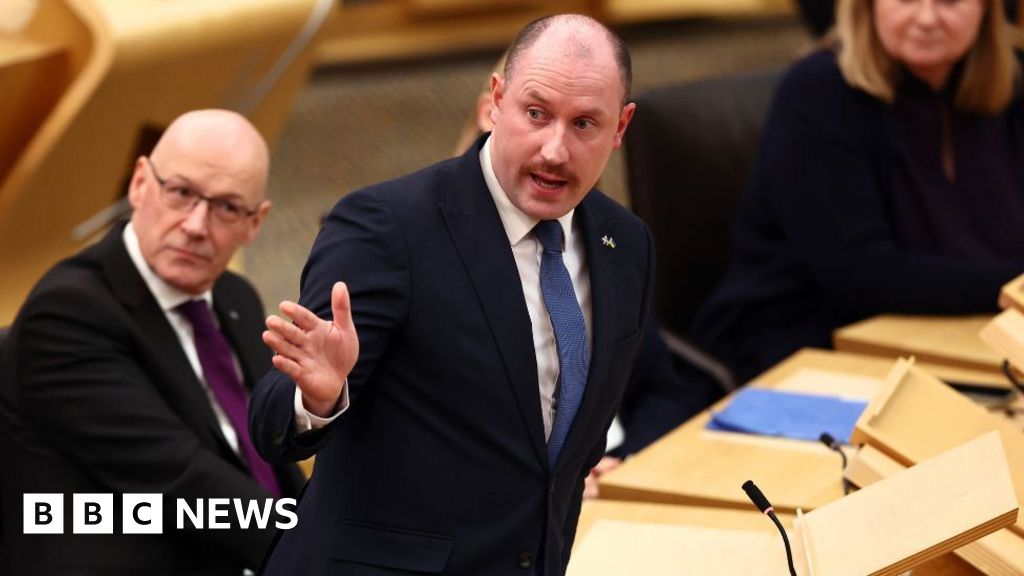ARTICLE AD BOX
By Jennifer Scott
Political reporter, BBC News
image source, PA Media
image captionSir Keir Starmer was elected Labour leader in the weeks following the first Covid lockdownThe winter of 2019 was certainly one of discontent for Labour.
Boris Johnson's Conservatives romped to election victory with an 80-seat majority, while Labour under Jeremy Corbyn recorded its worst result since 1935.
After Mr Corbyn stepped down, the race for the new party leader began.
Sir Keir Starmer - who had held the position of Brexit secretary in Mr Corbyn's cabinet - secured the top job in April 2020, but with it came the mammoth task of turning around Labour's fortunes.
So, ahead of his first in-person party conference appearance since taking the leadership, we take a look at Sir Keir's performance so far, what commitments he has made and whether his rule is chiming with both Labour members and the voting public.
Mr Corbyn announced his party's manifesto for the December 2019, election promising "radical" policies and "real change".
- Increasing the health budget by 4.3% and introducing a National Care Service
- Holding a second referendum on Brexit and giving EU nationals right to remain
- Raising the minimum wage to £10 and stopping state pension age rises
- Bringing forward Net Zero target to 2030s as part of a Green New Deal
- And nationalising key industries
But the proposals didn't win over the public and Labour lost swathes of its traditional heartlands in the Midlands and north of England, known as "the red wall".
During the subsequent leadership contest, Sir Keir launched a 10-point plan aimed at convincing the Labour membership he was the right person for the job, and the very first sentence appeared to echo his predecessor, with a promise to "maintain our radical values".
Some of the themes of that plan also reflected the priorities of Mr Corbyn, such as "common ownership" (or nationalisation) of public services and strengthening workers rights, as well as carrying on with the Green New Deal.
Sir Keir became leader in April 2020, and giving his acceptance speech from lockdown inside his home, said he would "bring [the] party together".
He also made it clear to the wider public he would be moving away from the Corbyn era, saying the party "cannot go on with business as usual" and "where we have to rethink, we will rethink".
Sir Keir also denounced the "stain" of anti-Semitism that had plagued Labour under Mr Corbyn's leadership and declared: "I will tear out this poison by its roots."
And while he repeated one of his 10 point pledges - to provide an effective opposition to the Tories in Parliament - he also promised to work constructively with the government in a political landscape now dominated by the coronavirus pandemic.
What has happened since?
Let's first look at anti-Semitism, which had dominated headlines under Mr Corbyn.
In the first days of his leadership, Sir Keir held meetings with Jewish groups, vowed to set up an independent complaints process and called for a report on all outstanding cases within a week.
This early action led to praise from community leaders, who said he had "achieved more in four days" than Mr Corbyn did "in four years".
In December 2020, the Equalities and Human Rights Commission published its report into the party's handling of anti-Semitism complaints, saying Labour was responsible for unlawful harassment and discrimination.
And in response, Sir Keir published a new plan for handling anti-Semitism in the party, committing again to that independent complaints process and addressing the backlog of anti-Semitism case.
Those moves - as well as some high profile suspensions of members, including Mr Corbyn himself after he called allegations of anti-Semitism in the party "exaggerated" - have won further praise from community groups and MPs.
But some on the left of the party believe instead that they have become victims of a "witch-hunt" for their support of Mr Corbyn, rather than any offences of their own.
Meanwhile, Mike Katz of the Jewish Labour Movement - which had complained to the EHRC about the handling of anti-Semitism allegations - told the BBC it would be "absolutely imperative, whatever else happens" for this conference to approve a more independent complaints process.
Opposition
Then there was that promise of a constructive opposition while also holding the government to account.
Becoming leader during the pandemic did not give Sir Keir a huge opportunity to confront the government.
He supported many of the government decisions on Covid restrictions, saying he did not want to oppose measures for opposition's sake.
And while his forensic, solicitor-like approach at the dispatch box won him plaudits when he did challenge the government - such as calling for lockdown sooner during the second wave - some in the party questioned whether he had been too soft early on.
Other Labour figures - especially Manchester Mayor Andy Burnham - were seen to be holding No 10 to account, while the PM's "Captain Hindsight" accusation reverberated.
Those close to him defend his "responsible" approach to the pandemic, but some worry the damage has been done by the lighter touch early on in his tenure.
So, what about his own policy proposals since taking on the job?
New pledges from Sir Keir were few and far between at the start of his tenure.
His supporters said it was right for him to take stock rather than listing new priorities, and coronavirus needed to be the focus for Labour while it was the focus of the public.
But it did mean voters were left unsure of what he stood for.
Policy proposals have since emerged, such as giving all workers "full" employment rights and introducing start-up loans for 100,000 new small firms outside of the south east - but did they chime with the "radical" approach promised in the leadership contest?
After a somewhat chaotic rejig of his top team in May, Sir Keir announced his former shadow chancellor - now party chair - Annelise Dodds would be leading a new policy review focused on six areas:
- Better jobs and better work
- A green and digital future
- Safe and secure communities
- Public services
- A future where families come first
- And Britain in the world
During the announcement, he claimed he was leading a "very united party" who would work together on building a strong manifesto before the next election - due by 2024.
And supporters say that his desire for radical change will become clear.
image source, Getty Images
image captionSir Keir has tasked Anneliese Dodds to lead Labour's policy reviewSo has Sir Keir united the party, as he promised?
To put it simply, no. When he took over the leadership, he clearly felt it was important to distance himself from the Corbyn era.
The ousting of both Rebecca Long Bailey from his frontbench and Mr Corbyn from the backbench were also red rags to the bulls of the left, as are proposed changes to the way party leaders are chosen.
Now that faction - and with it, a healthy portion of the party membership - is feeling overlooked. Prominent figures like John McDonnell and Diane Abbott are unafraid to take to the airwaves to criticise his approach.
But Sir Keir does appear to have the majority of his parliamentary party (the MPs) onside, who believe his direction is more likely to win the support of voters.
The fight between the different wings in the Labour Party is nothing new and any leader would struggle to stamp out infighting in 18 months.
What may be more important for Sir Keir's and his party's future, however, is whether his moves are impressing the public, as many MPs hope.
image source, Reuters
image captionCorbyn loyalist Rebecca Long Bailey was sacked from Sir Keir's shadow cabinet after sharing an article that contained an anti-Semitic conspiracy theoryThe last set of local elections in May did not bring a raft of strong results for the party. Yes, Labour managed to keep hold of their mayoralties in England, but they still lost eight councils overall.
And while they held onto the seat of Batley and Spen in a 2021 by-election, they saw disaster strike in the former Labour seat of Hartlepool, which was taken by the Tories.
Sir Keir has regularly repeated his frustrations at being confined to his home in the early months of his leadership because of coronavirus.
It's meant his public profile has suffered.
That anonymity was evident when - during a meet-the-voter session with the BBC in Blackpool - one former Labour voter admitted: "I've got no idea who he is."
He told the BBC he knew it would be a "slow, long, hard road" to regain the trust of voters and he didn't expect to do it in 18 months.
But Sir Keir may not have much more time to fight the fight.
After the ministerial reshuffle last week, the Tory co-chairman Oliver Dowden was reported to have told staff to ready for themselves for an election in as little as 20 months time.
On average, polls show the Conservatives consistently ahead of Labour, on average by four points this month, although one poll in September for YouGov did put Labour ahead for the first time since the start of this year.
But when it comes to Sir Keir's own approval rating, he's poorly regarded with Boris Johnson seen as a better prospect for prime minister.
With the policy review well under way, an 11,500 word essay on what he stands for and how he wants to change the UK just published, and an in-person conference speech to demonstrate his post-Covid vision for the country, Sir Keir will be hoping his message resonates.
But he may need to pick up that pace if he wants to get to the end of the road ahead, and end up in Downing Street.

 3 years ago
37
3 years ago
37








 English (US)
English (US)